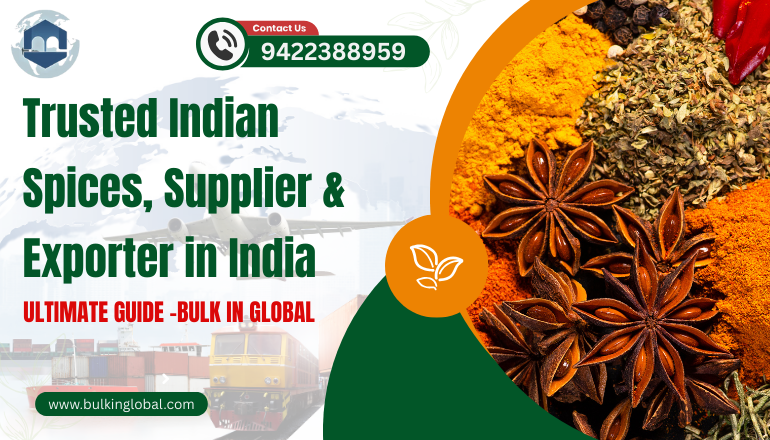


In a $25 billion global spice trade, one misstep doesn’t just cost you money—it costs you trust.
A study by the Global Food Safety Initiative reported that 72% of product recalls in the spice industry are directly tied to inconsistent sourcing standards. It’s not the quality you saw in the samples—it’s the quality that arrived in bulk that dictates your brand’s survival.
This is the silent test buyers face. The shipment might meet price points, but can it survive scrutiny in FDA inspections, EU audits, or consumer backlash?
That’s why trusted spice exporters India continue to gain more global traction—because in today’s volatile trade landscape, reliability is the most profitable currency.
According to Spices Board India, over 80% of Indian spice exports are rejected due to poor post-harvest handling or inadequate processing standards. The root cause? Fragmented sourcing and absence of scientific process control.
Reliable Indian exporters of chili, turmeric, and cardamom know this better than anyone. They don’t gamble with moisture levels, oil percentages, or pesticide traces.
Instead, they embrace a rigorous chain of custody. From pre-harvest soil assessments to advanced dehydration controls, every step is built on data-backed predictability.
That’s where trust isn't spoken—it’s measured.
A Deloitte trade insight report revealed that spice importers globally lose $7.4 million annually due to supplier unreliability—late shipments, wrong documentation, quality mismatches.
Now ask yourself—what would it take to recover if one failed batch triggered a contract breach? Or worse, regulatory blacklisting?
It’s no wonder wholesale spice suppliers India trusted globally are now investing heavily in real-time quality monitoring, AI-driven lot tracking, and blockchain traceability. These aren’t just innovations—they're armor.
Because when your spices reach markets like Japan, UAE, or the U.S., you’re not competing on price. You’re competing on precision, compliance, and reliability.
This story reflects a growing trend in the West. With private label spice manufacturers India offering agility, more brands are shifting from mainstream sourcing to direct, ethically certified exports.
The Canadian retailer who took that leap grew by 230% in quarterly spice sales. Why? Because they could finally communicate something global consumers crave—traceability and authenticity.
It wasn’t just about being affordable. It was about being accountable.
A 2024 UNFAO report confirmed that only 18% of globally sold “organic” spices meet full traceability and zero-pesticide certification standards. The rest rely on ambiguous claims.
This is why the surge in demand for organic spice exporters from India has been fueled by actual documentation: NPOP, USDA, EU Organic, JAS—and field-level geo-verification.
In response, India's organic spice exports saw a 21.8% YoY rise in Q3 2024, led by turmeric, cumin, and coriander. Buyers aren’t just chasing “clean” labels—they’re chasing verified soil-to-shelf provenance.
Traditionally, bulk meant compromise. But with the digitization of Indian agriculture, bulk is becoming synonymous with traceable precision.
According to a 2025 AgriExport Council analysis, integrated warehousing and predictive supply chain modeling in India has led to a 38% increase in OTIF (On-Time In-Full) export shipments.
That’s why new-generation wholesale spices suppliers in India are being viewed not just as commodity sellers, but as solution architects. From demand forecasting to third-party testing, their role has evolved.
If your bulk supplier isn’t offering precision, they’re offering problems.
There’s a reason the same top spices companies in India dominate the international charts year after year. They don’t just export—they innovate.
They invest in:
These aren’t luxuries anymore. They’re expectations.
And while small-time exporters still rely on manual drying yards and brokers, the best spice exporter in India is already planning for climate-resilient sourcing models and ESG-driven logistics.
It’s no coincidence that Kolhapur is now listed in the top 5 spice processing zones in Maharashtra, contributing to over ₹180 crore worth of annual spice exports.
The blend of traditional spice farming expertise with modern infrastructure here has created a new benchmark in supply chain design. It’s the reason Kolhapur is now a recognized hub for whole spices manufacturers in India.
And companies based here are setting new global norms—from cold chain deployment to real-time digital container tracking, adding a layer of resilience that global buyers now demand.
Global spice trade is no longer forgiving. One lapse, and the ripple can shake your brand’s core.
If you’re ready to work with Trusted indian spice importers globally, if you value long-term compliance over short-term convenience, and if your business is built on quality—not compromise—then it’s time to align with a supply chain that mirrors your standards.
Flavor may bring them in. But trust? That’s what makes them stay.